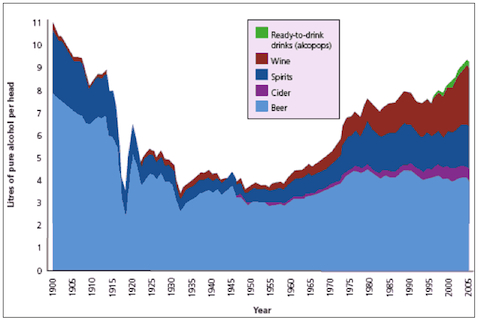
Though Europeans are generally drinking a great deal less these days, the Scottish are bucking the trend. Per the chart above, alcohol consumption has been steadily rising in the land north of the border established by the Treaty of York. The question that no one seems able to answer with any degree of certainty is why Scotland’s thirst for hooch cannot be quenched. The Scottish government evidently believes the conclusions made in this 2008 study, which lays a lot of the blame on the declining prices:
here is strong evidence from over 50 studies conducted in 15 European countries, America, Canada, New Zealand and elsewhere, that levels of alcohol consumption are closely linked to the retail price of alcoholic beverages. As alcohol becomes more affordable, consumption increases. As the relative price increases, consumption goes down. In Switzerland in 1999, a 30 to 50% reduction in taxation on foreign spirits, led to a 28.6% increase in consumption of spirits. There was no significant change in the consumption of wine or beer. In March 2004, Finland cut tax on alcohol (by one third) in an effort to reduce the level of cross-border shopping undertaken by Finns in other EU countries, particularly neighbouring Estonia, where the price of alcohol was much cheaper. Following the change, liver cirrhosis deaths were found to have risen by 30 per cent in just one year, as alcohol consumption increased by 10 per cent.
In Scotland, in real terms (taking into account disposable income), alcohol is 62% more affordable today than it was in 1980.
Scotland is trying to correct that problem with a new pricing law, which seeks to forbid discounts for buying alcohol in volume. But my hunch is that the only economic tactic that will truly work is the imposition of a minimum price per unit of alcohol. That would means the end of cheap fixes like The Purple Tin, which is basically the King Cobra of Scotland. If a unit of alcohol cannot be sold for any less than forty-five pence, many fewer will have the means to splurge on ten cans of high-alcohol lager. Which will hopefully mean a lot less of this.
A question, though: Has anyone studied what led to the decrease in Scottish alcohol consumption prior to the sharp WWI-related drop-off?


Pete Warden // Jan 20, 2012 at 2:44 pm
I lived in Scotland for five years, and no discussion is complete without mentioning Buckfast Tonic Wine, aka “Wreck the hoose juice”:
http://en.wikipedia.org/wiki/Buckfast_Tonic_Wine
Brendan I. Koerner // Jan 20, 2012 at 3:30 pm
@Pete Warden: Always been curious to try that. What’s it like? At 15% ABV, it will be a lot dearer if minimum per-unit pricing becomes a reality.
Davis X. Machina // Jan 21, 2012 at 11:19 am
A question, though: Has anyone studied what led to the decrease in Scottish alcohol consumption prior to the sharp WWI-related drop-off?
Taxation? The Chapel was ani-drink, the Welsh Wizard was Chapel. Those were the days of The People’s Budget, when Lloyd-George was Chancellor, and alcohol taxes were traditionally raised to persuade the upper classes that the working class was also doing its bit to balance the books.
Just a guess….
Jeremy // Jan 23, 2012 at 8:52 am
I’m getting a 404 on your image of the old purple tin … but it did make sense of the lyrics to Alabama 3’s Old Purple Tin, which I had previously assumed to refer to meths, stained purple in the UK to prevent (?) people drinking it.
Brendan I. Koerner // Jan 23, 2012 at 9:20 am
@Jeremy: Sorry it’s not resolving for you–works on this end. Here’s another image, though I must warn you that it’s not terribly exciting:
http://hywelsbiglog.files.wordpress.com/2008/03/spm_a2585.jpg?w=450&h=600
I first encountered in the term in Irvine Welsh’s Filth; the drink is essentially derided as the worst of all Scottish drugs, including heroin. When the main character starts to buy it at the supermarket, you know he’s done for.
Brendan I. Koerner // Jan 23, 2012 at 9:24 am
@Davis X. Machina: Thanks for the history. If taxation was indeed the cause of the decline, then that’s a point in the favor of the current anti-alcohol campaigners.
I’d be curious to know, though, whether the decline in drinking leads to fewer social problems. When taxes go up, which segment of the drinking population cuts back–the pint-after-work crowd, or the yobs who bash in skulls on Saturday nights?